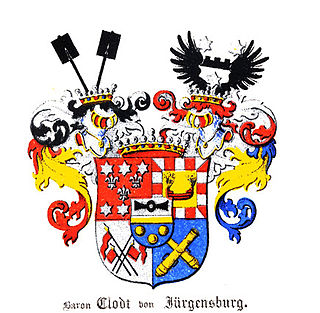Top Qs
Timeline
Chat
Perspective
Peter Clodt von Jürgensburg
Russian sculptor (1805–1867) From Wikipedia, the free encyclopedia
Remove ads
Peter Jakob Freiherr[a] Clodt von Jürgensburg (Russian: Пётр Карлович Клодт, romanized: Pyotr Karlovich Klodt; 5 June 1805 – 25 November 1867) was a Russian sculptor. He was well regarded by Nicholas I of Russia.
This article needs additional citations for verification. (January 2021) |
You can help expand this article with text translated from the corresponding article in Russian. (September 2014) Click [show] for important translation instructions.
|


Remove ads
Biography
Summarize
Perspective
Born in Saint Petersburg, Klodt belonged to a distinguished family of Baltic Germans, the Clodt von Jürgensburgs. The family's origin remains unknown, but it has been speculated that it originated in Westphalia. Klodt started his career as a professional artillery officer and amateur sculptor. He attended classes at the Imperial Academy of Arts in Saint Petersburg, where his mastery in depicting horses eventually won him the rank of academician and the praise of the Emperor. As legend has it, Nicholas I remarked of Klodt that he "creates horses finer than any prize stallion does".
Klodt's most famous group of equestrian statues, the Horse Tamers, was installed at the Anichkov Bridge in 1851. He also produced the bronze statue of Ivan Krylov in the Summer Garden (1848–55). It was the first monument to a poet erected in the Russian Empire.
Klodt collaborated with Vasily Demut-Malinovsky on the statue of Saint Vladimir in Kiev (installed in 1853) and the statuary for the Narva Triumphal Gate. He also sculpted a quadriga above the portico of the Bolshoi Theatre in Moscow.
Klodt's last significant work was a posthumous tribute to his patron, a horse statue for the equestrian Monument to Nicholas I on Saint Isaac's Square. Installed in 1856–1859, it was the first equestrian statue in the world with only two support-points (the rear feet of the horse). Even the Bolsheviks, who destroyed the memorials to Nicholas I across Russia, did not dare to demolish this unique statue.
Klodt died in his estate in the Grand Duchy of Finland within the Russian Empire on 20 November 1867. His son and nephew Mikhail continued the artistic traditions of the family and became notable painters of the Peredvizhniki school.
Remove ads
Gallery
- The monument to Nicholas I of Russia in St. Petersburg, late 19th century photochrome print.
- The monument to Nicholas I of Russia, modern view.
- The monument to Nicholas I of Russia, close-up.
- One of the horse tamers on the Anichkov Bridge, St. Petersburg.
See also
Wikimedia Commons has media related to Peter Clodt von Jürgensburg.
Notes
References
Sources
Further reading
Wikiwand - on
Seamless Wikipedia browsing. On steroids.
Remove ads





